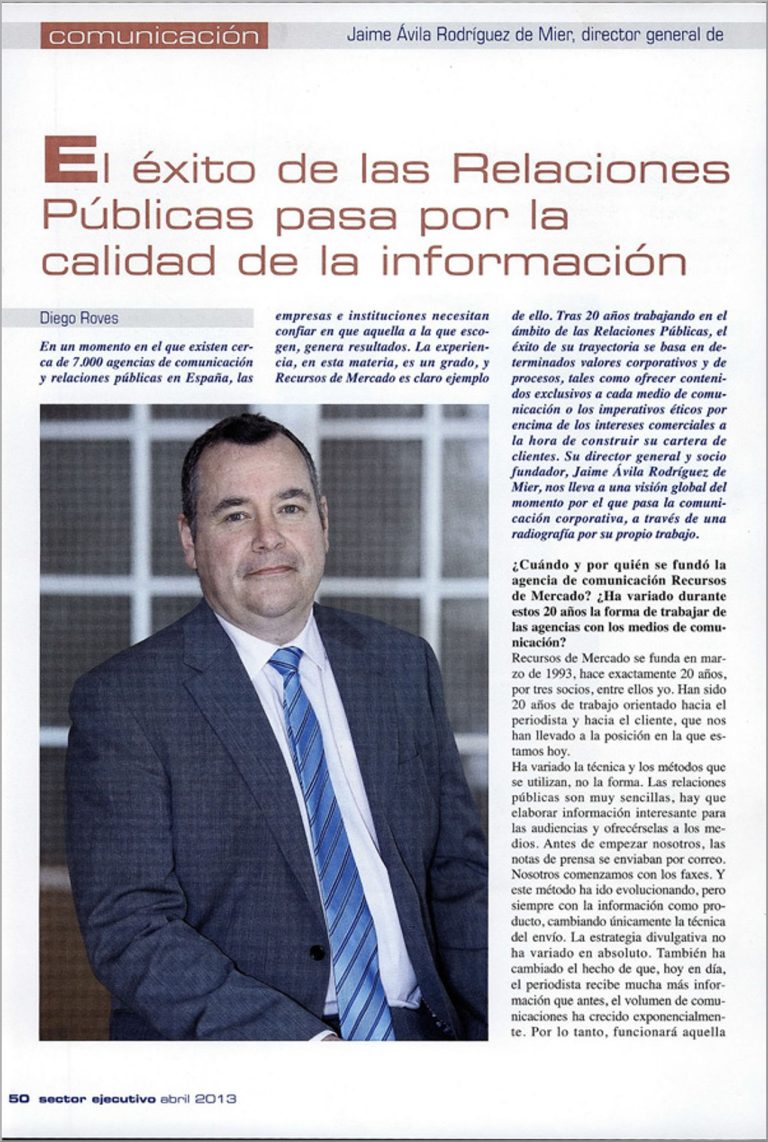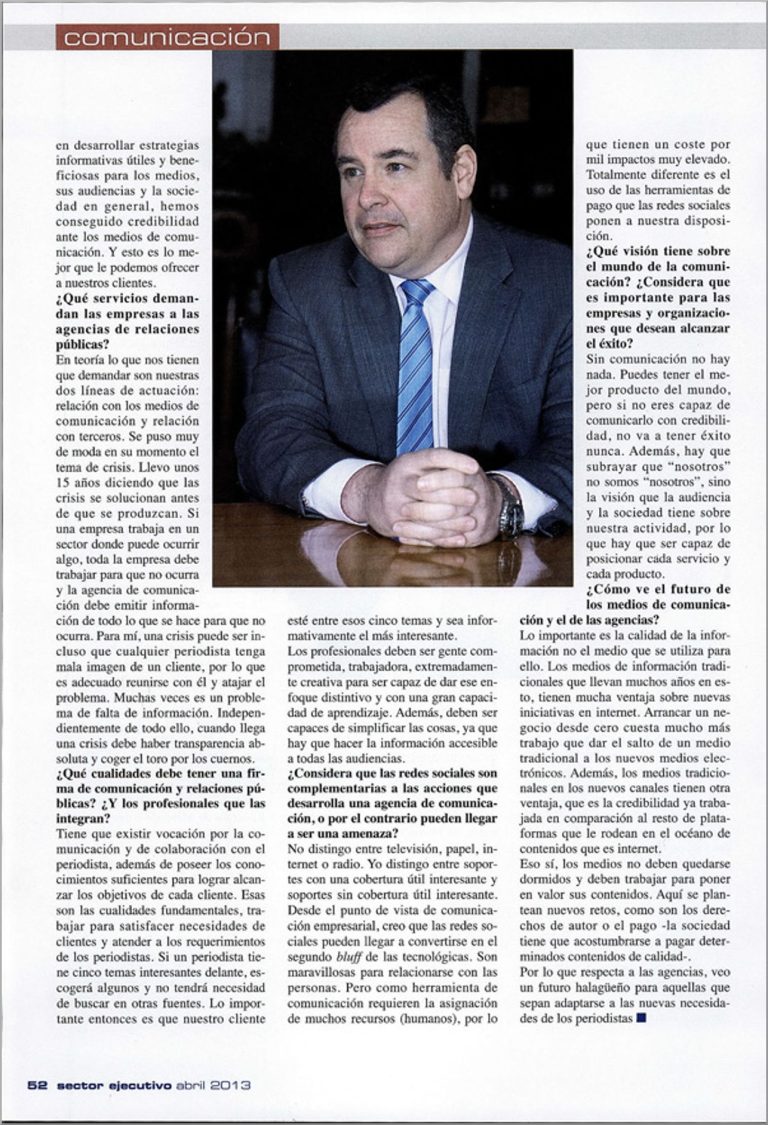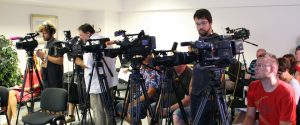EAt a time when there are more than 20,000 communications and public relations agencies in Spain, companies and institutions need to be confident that the one they choose will generate results. Experience, in this matter, is a degree, and Recursos de Mercado is a clear example of this. After 20 years working in the field of public relations, the success of its trajectory is based on certain corporate and process values, such as offering exclusive content to each media outlet or ethical imperatives above commercial interests when building its client portfolio. Its managing director and founding partner, Jaime Ávila Rodríguez de Mier, gives us an overview of the current state of corporate communication through an x-ray of his own work.
When and by whom was the communication agency Recursos de Mercado founded? Has the way agencies work with the media changed over the last 20 years?
Recursos de Mercado was founded in March 1993, exactly 20 years ago, by three partners, including myself. It has been 20 years of journalist- and client-oriented work that has brought us to the position we are in today.
The technique and methods used have changed, not the form. Public relations is very simple, you have to produce interesting information for the audiences and offer it to the media. Before we started, press releases were sent by post. We started with faxes. And this issue has evolved, always with information as a product, changing only the technique of sending it. The information strategy has not changed at all. The fact that, nowadays, journalists receive much more information than before, the volume of communications has grown exponentially, has also changed. Therefore, the agency that attracts the attention of the professional with quality information will work.
How do you understand Public Relations and Communication from Recursos de Mercado?
There are people who try to do publicity through public relations and vice versa, which makes no sense. The impact of an advertising page is not the same as an interview page, because to achieve impact with the latter you need the audience to read or listen to the interview. This is how we understand public relations, we are an intermediate element between companies and journalists and our job is to produce quality reports for citizens, to provide them with the information they need to decide what they are going to do. It makes no sense to appear in the media for the sake of appearing in the media, it is exhausting the image of the brand, and this and the message are built through Public Relations, another thing is to ensure that this message is broadcast more frequently thanks to advertising.
Do you think that companies have become aware that it is important to have information professionals at their service?
They are faced with a problem, which is getting the right team to run the company’s communications department. There must be more than 20,000 communication agencies, but if they do not produce the expected results with the chosen team, things are not going to work out. We are in a sector where annual contracts are common, so the problem is spread over a long period. Therefore, the need and awareness exists, but only a few teams are able to deliver results. On the other hand, the internal communication departments of companies are faced with a further problem: they are only able to offer news about a specific company, but communication agencies can offer the journalist a wide range of possibilities, as wide as their portfolio of clients.
Which sectors or groups do you target?
We have an ethical position that we have been trying to follow to the letter for 20 years: agreements that prohibit the duplication of clients, i.e. working for two competing companies, which forces us to be an agency that works in all sectors of activity, as we have access to sensitive information on each client and it would be unethical to work for other companies in the same segment. In this way, we work with only one client in each sector.
What is the added value that Recursos de Mercado brings to its clients?
In addition to the personalised treatment of the client, it is important to emphasise that not every company can be our client. If we do not see a strategy for a certain client, we understand that we are not the right professionals to carry it out. We do not take on any project if we have no guarantee of success. We have been doing this for 20 years, doing it well and opening doors. I believe that after so many years focused on developing useful and beneficial information strategies for the media, their audiences and society in general, we have achieved credibility with the media. And this is the best we can offer our clients.
What services do companies demand from public relations agencies?
In theory, what we should be asked for are our two lines of action: relations with the media and relations with third parties. The subject of crises became very fashionable at the time. I have been saying for about 15 years that crises are solved before they happen. If a company works in a sector where something can happen, the whole company must work to prevent it from happening and the communication agency must issue information on everything that is done to prevent it from happening. For me, a crisis can even be that any journalist has a bad image of a client, so it is appropriate to meet with him and tackle the problem. Often it is a problem of lack of documentation. Regardless of all that, when a crisis comes, there must be absolute transparency and taking the bull by the horns.
What qualities should a communications and public relations firm have, and the professionals who work for them?
There has to be a vocation to serve, to help and work with the journalist, as well as a vocation to achieve the objectives of each strategy outlined for each client. These are the fundamental qualities, working to satisfy the needs of clients and journalists, making their work simple. If a journalist has five interesting topics in front of him, he will choose a few and will not go looking for them outside. The important thing then is that our client is among those five topics.
Professionals must be committed, hard-working, extremely creative people to be able to provide that focus, with the ability to learn. They must also be able to simplify things, because we often work with clients whose words are incomprehensible to audiences.
Do you consider that social networks are complementary to the actions developed by a communication agency, or on the contrary, can they become a threat?
I don’t distinguish between television, DTT, paper, internet or radio. I distinguish between media with interesting useful coverage and media without interesting useful coverage. I think social networks are the second technological boom. They are wonderful for social relations, but people have been misled by being told to go and do business on social networks. I don’t believe in it as a way of doing business face to face, but as a way for companies to access a very broad spectrum of audience where you can filter by all sorts of variables to access a more specific target, but only if you use a set of tools that are for sale.
How do you view the world of communication and do you think it is important for companies and organisations that want to be successful?
Without communication there is nothing. You can have the best product in the world, but if you are not able to communicate it with credibility, it will never succeed. Moreover, it must be stressed that “we” are not “us”, but the vision that the audience and society have of our activity, so we must be able to position each service and each product.
How do you see the future of media and agencies?
The important thing about a medium is its ability to communicate, regardless of the medium. All companies that have been in business for many years have a big advantage over new initiatives on the internet, and starting a business from scratch is a lot of work. There are new challenges here, such as copyright or the ability to pay – society has to get used to paying for certain quality content. In addition, traditional media in new channels have another advantage, which is the credibility they have already built up compared to the other platforms that surround them in the ocean of content that is the internet. However, the media must not fall asleep and must work to enhance the value of their content.
I see a bright future for those agencies that know how to adapt to the new needs of journalists, uniting their interests with those of their clients. The world of journalism is constantly changing. Nowadays it is particularly difficult to organise breakfast meetings or presentations, because many media outlets do not have enough staff to send a professional to one of these events. For this reason, new formulas have to be invented in order not to lose contact with them, such as exclusive content for each media outlet or individual visits for the presentation of a certain product.
Interview with Jaime Ávila Rodríguez de Mier
General Director of Recursos de Mercado
Sector Ejecutivo on April 2013







